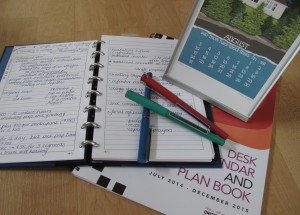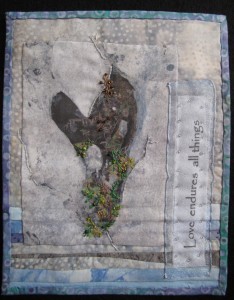My life has thrummed with choice recently. In among the more mundane choices of daily life (cereal for breakfast, or eggs; chicken sausage for supper, or curry) have been the less daily, but increasingly urgent, choices around the sabbatical (what to pack, which ferry to get from here to there, airbnb or hotel for this overnight, car or train between houses). My father’s move invited me not only to choose whether I would fold some material, physical items from his life and my mother’s into the space I share with my husband, but what we will need to discard if we want to do that. Watching and participating in the preparation for that move pushed my husband and me to be more intentional about what we carry with us on our life journey: Do we really need what is contained in this set of files, this shelf of books, this box of memorabilia?
I have written about choice before in more than one blog, from more than one perspective. But I find myself in a particularly thin place as I write these words. My own path and the choice of priorities in my life took a sharp turn three days ago when I received a call from my daughter to tell me that her ‘St Paul’ mom, my beloved friend Lori, had slipped very close to the edge of life itself. She had developed a bacterial infection while waiting for an organ transplant and, after valiantly withstanding almost five decades of frequent health crises, her physical body was exhausted; in fact, beyond exhausted. In a matter of hours, she stepped quietly and confidently across the threshold before I could reach her bedside, giving herself permission to let go of what was and discover what was to come.
She made her choice. She chose to stop fighting, to stop waiting, to stop clinging to this temporal, space-bound existence. She chose not to simply wait for her last breath, but to lean forward into it. My daughter and hers were with her when she said aloud to herself “It’s time to let go and die, Lori. Just let go.” Those words and that choice will stay with me as a model for the rest of my life.
But as I have been grieving over the past three days, I realize that her choice in her journey into death is a natural extension of the choices she made all her life as she finished college, married and had a child, divorced, raised her daughter (mostly as a single parent), built friendships and a larger community in which she and her daughter were held, chose meaningful work, and filled her days and weekends and evenings with art and music and theatre and sports and church and visiting museums and taking her daughter north to see the place where the Mississippi River begins, and celebrating the richness of life in Minnesota in general, and in the Twin Cities in particular. Through all of that, she steadfastly chose not to be defined by her health issues (which started in early childhood), but to take each day as it came, fill it with life, and lay it aside for the next one.
Occasionally, we would talk about this and I would admit my own tendency to insist that the stars align just right before I took advantage of some event. I would admit to her my desire to have all my ducks in a row before I took a class, took a trip, learned a new skill, accepted an opportunity. I told her more than once how much I appreciated her courage and determination to experience the things that brought her joy and challenge and wisdom without waiting until she felt better, had that surgery, was done with dialysis, woke up more energized. To live without waiting until things were perfect or near perfect. She would laugh. I knew it made her vaguely uncomfortable to be a role model, to be the center of attention.
 Lori taught me about accepting life as it is – not as I might want it to be. For a couple of years after I met her – while we were still primarily professional colleagues and not yet friends – I would describe her to people as someone who was easy to be with because she was so laid-back. But I came to realize that she chose that personality, she built it and reinforced it by hundreds of thousands of little decisions that turned her focus to the positive, the optimistic, the upbeat, the hopeful, the humorous, toward potential and possibility and opportunity. It was hard to complain around her. I did it, but even as I did it, I would find myself looking for the ludicrous in the situation I was describing, looking for the way to laugh about it, or make it less fraught. In her presence I chose to see events through a lens more like hers, not because I ever felt judged, but because I like that lens better and she literally en-couraged me to use it.
Lori taught me about accepting life as it is – not as I might want it to be. For a couple of years after I met her – while we were still primarily professional colleagues and not yet friends – I would describe her to people as someone who was easy to be with because she was so laid-back. But I came to realize that she chose that personality, she built it and reinforced it by hundreds of thousands of little decisions that turned her focus to the positive, the optimistic, the upbeat, the hopeful, the humorous, toward potential and possibility and opportunity. It was hard to complain around her. I did it, but even as I did it, I would find myself looking for the ludicrous in the situation I was describing, looking for the way to laugh about it, or make it less fraught. In her presence I chose to see events through a lens more like hers, not because I ever felt judged, but because I like that lens better and she literally en-couraged me to use it.
She didn’t yearn for what she couldn’t have (for instance, a life without medications or surgeries or infections or unexpected glitches), she focused on what could happen and gathered memories and experiences that fed her and grew her spirit. When her kidney transplant failed after 8 years, and I couldn’t treat her to a restaurant meal during my visits, she would hook herself up to her home dialysis machine and we would sit on her bed together late at night, talking about our daughters, talking about the concerns and growing places in our own lives, while waiting for Jon Stewart to come on.
I have known all my life that I have choices. As an educated, healthy, light-skinned woman in a very free and developed country, I have more choices than most other people in the world. Sometimes I make choices that feel just right, or the best option available; sometimes I make a choice I regret, or a choice that is a dead end, and I think about how I want to do it differently next time. But I spend far less time reflecting on the arc and pattern and the tone of my choices, maybe because I begin each day with the assumption that I still have a lot of days, a lot of months, a lot of years to recover from my mistakes. If today I’m feeling put upon and cranky, I often indulge my crankiness and ill humor expecting I will get over it tomorrow or the next day. I rarely ask myself, “Yes, but do you really want to spend today cranky?”
 My guess is that Lori never forgot that today was all she could expect, that tomorrow might not be ‘better’ because tomorrow might not come at all. My guess is that she was aware that she might not even get the whole day; she might have only this hour, this minute. I suspect she never forgot that each morning was a bonus, and she could live it as a gift or as a burden. She consistently chose gift and she received the gift with open hands and an open heart.
My guess is that Lori never forgot that today was all she could expect, that tomorrow might not be ‘better’ because tomorrow might not come at all. My guess is that she was aware that she might not even get the whole day; she might have only this hour, this minute. I suspect she never forgot that each morning was a bonus, and she could live it as a gift or as a burden. She consistently chose gift and she received the gift with open hands and an open heart.
When I woke up this morning, my first thought was that she is gone. I will not be getting an e-mail from her today, I won’t be seeing her for tea or lunch even though I am here in the Twin Cities. My second thought was that this day is a bonus. I can choose to receive it with love and gratitude, or with despair and grief. I will cry today, I imagine, when the waves of awareness pass over me. But I will also laugh, and wonder, and read a book, and hug my daughter, and talk with my son-in-law about his upcoming research trip to Nepal. I will walk in the cold, and eat good food, and cherish Lori’s daughter when I see her this afternoon.
And I will remember that those are choices that, together, mark the milestones of my life. I will be more intentional about welcoming them with gratitude, and releasing them with blessing. Thank you for accompanying me on this journey.
–Andrea
Text © 2015, Andrea La Sonde Anastos
Photos ©2011 and 2014 Immram Chara, LLC


This is a powerful message, thank you, Andrea. YOU are an amazing woman and I am blessed to be on this journey with you. Jackie G
Thank you so much for your words. I know the time is here when (as someone said), I will be attending more funerals than weddings. This, too, is part of living and loving. But I have to confess I don’t like that reality. I have not yet surrendered to it with grace…only with grudging acceptance.
The world will be poorer for Lori’s absence, but (oh) how rich we are because she lived.
–Andrea